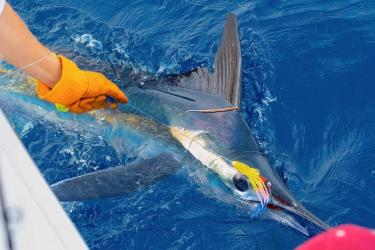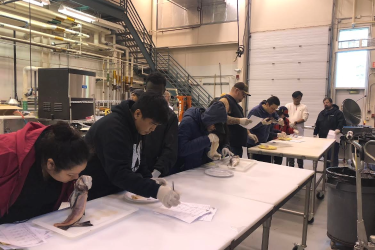Where did you grow up?
I grew up in Kansas City, Missouri. I have always been grateful for growing up in a landlocked state because it made every visit to a mountain, ocean, or any large body of water extra special. My family vacationed most years in Destin, Florida where I found a real curiosity for all things water-related.
Where did you go to school and in what subject did you get your degree(s)?
I attended Northwest Missouri State University located two hours north of Kansas City, Missouri. Yes, I moved even further from the Gulf of Mexico. Despite the location, the university was one of only a handful in the Midwest that offered a marine biology degree. Students spent their summers at various coastal schools to acquire hands-on learning. As part of this program, I spent one summer at the University of Southern Mississippi Gulf Coast Research Laboratory in Ocean Springs, Mississippi. The next summer I studied at Chincoteague Bay Field Station in Wallops Island, Virginia, and spent a couple of weeks at Mote Marine Laboratory in Summerland Key, Florida. Each location was host to a very distinct ecosystem which challenged me to expand my knowledge of marine species. Thankfully I had great instructors who created an ideal balance between learning in the classroom and then applying those topics during field trips offshore. I graduated with a Bachelor of Science in Marine Biology and still had another year of athletic eligibility for the track and field team. So, I decided to broaden my skills and earned a Master of Science in Applied Health and Sport Science.
How did you come to work at the Southeast Fisheries Science Center?
I had a college friend who was a fishery observer and suggested I apply. I started as a reef fish and shrimp observer in 2014 which involved being on board fishing vessels to document the catch and bycatch (non-target species). I was involved at the very beginning of a program to annotate reef fish species seen on video that has been captured on vessels to automate data collection. We reviewed videos with various species on deck or on a conveyor belt and labeled each individual with our highest level of confidence. The end goal of these annotations was to train and improve image analysis machine learning algorithms so this technology could eventually be used to automate and expedite shipboard data collection. I also cross-trained for the Platform Removal Observer Program so I could observe protected species like marine mammals and sea turtles during oil platform demolitions. After nearly 90 trips and over 1,000 days at sea during the course of 7 years, I decided to finally transfer to office life and became an observer coordinator in 2022.
What do you do at the science center?
As a coordinator for the Reef Fish and Shrimp Observer Program, I am involved with almost every observer-related aspect of the program. My job is nonstop—even on the weekends. I conduct interviews during the hiring process, teach safety and protocol training, determine trip assignments, check data for quality control, debrief observers, and inventory gear. I also speak with vessel owners and captains to gauge fishing efforts and trip coverage for each quarter. At times, observers have less than 24 hours to travel to port to board fishing vessels, so the coordinators do their best to work efficiently as a team.
I spend the bulk of my office day reviewing data for accuracy and speaking with vessel owners and captains. I am helping to develop a tablet program for observers to collect data electronically which will allow for data to be entered in real time and reduce errors. I am also one of the electronic monitoring leads focusing on commercial shrimp vessels. Under the guidance of Dr. Elizabeth Scott-Denton, I have learned about the numerous applications of using technology to record data in the field. A large portion of the annotating effort is from our subject matter experts (observers) who will help when they are between trips. Their feedback about camera locations helps shape future projects and study designs.
What do you like most about your position?
While I desperately miss being in the field collecting data on vessels, I have come to really appreciate the process of developing new programs. Teaching others about the workflow of annotation has been very rewarding. It has also been a great opportunity to learn about the wide variety of groundfish species that are captured in shrimp trawls in the Gulf of Mexico. The goal of both of these projects is ultimately to collect data in a more streamlined manner. Observers work in a harsh environment offshore so anything that makes their job easier is a win.
What advice would you have for someone interested in a career at NOAA Fisheries?
I chose marine biology because it was a completely different world to me. The summers I spent at the coast for my undergraduate degree created unique opportunities to explore new environments and meet new people. I came to a decisive crossroad after completing my Master's degree and eventually found my way back to the water. But, the nonmarine-related experiences from my graduate education gave me a better understanding of people and how they interact with their environment. The ability to apply that knowledge and experience with observers, captains, statisticians, and other industry representatives is incredibly valuable. I would advise others to be open to different paths and know that you can always pivot again.
Is there a book, quote, or person that influenced you to be the person that you are today?
My family, and specifically my parents, have been incredibly supportive of my decision to move away from the Midwest for this unique field of study. They must have known that my determination to continue my pursuits would eventually pay off. Working offshore for months at a time without any reliable communication can be incredibly isolating. My parents were always the best at keeping me positive and in a good headspace.
What do you like to do outside of work?
With a Master's degree in Applied Health Science and years of competing in various sports, I will always be drawn to fitness. I spent my final year of college earning a second All-American award and training as an alternate for the U.S. Women’s Bobsled Team, so I don’t think I will ever be able to shake that athlete mindset. I start my days early to work out before heading into the office. I also plan on training for an IronMan in the near future with my fellow observer coordinator, Michael Bradley. When I am not training, I enjoy the outdoors. In between deployments as an observer, I would spend 2–3 weeks traveling across the United States visiting national parks, monuments, reserves, and historic sites. I have visited more than 200 sites to date. The majority of the time I camp in the backcountry or in my rooftop tent to hone my skills in astrophotography. With my current schedule, I have to be strategic with my vacation days, but I plan to make my way to Utah again before the end of the year to hike, climb, and continue exploring.





